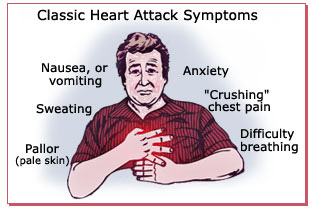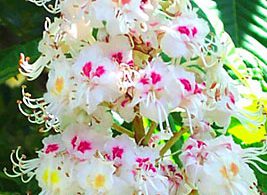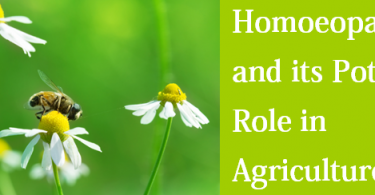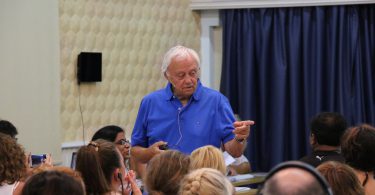
The heart is the motor that keeps the blood in motion throughout all the blood vessels in the body. In order, for the heart muscle to pump properly, it needs to be nourished by coronary blood vessels. Any disease or blockage of the coronary arteries can deprive the heart muscle with the necessary oxygen and blood it needs for proper function.
A heart attack, medically known as myocardial infarction, is the death of an area of heart muscle caused by the blockage of a coronary vessel. This obstruction of blood flow through one of the branches of the coronary artery is commonly caused by a rupture of an atherosclerotic plaque. Blood flow may be so severely diminished, or totally occluded that a portion of the heart muscle dies.
The most typical symptom of a heart attack is chest pain (angina pectoris) that may radiate to the left arm, neck, and jaw. Other symptoms may include shortness of breath, heat in the chest, anxiety, light headedness, or loss of consciousness.
The major risks factors for a heart attack are diabetes, lack of exercise, high blood pressure, sedentary lifestyle, old age, hypercholesterolemia, obesity, smoking, a high-sodium diet, and genetic predisposition.
In January, you may have noticed TV commercials addressing heart attack prevention. This is because most heart attacks occur during the month of February.
There are five tests that can detect a heart attack:
Electrocardiogram (ECG)
Coronary angiography
Exercise stress test
Nuclear scan
Blood test
Homeopathy in Practice
The homeopathic goal is to lower high blood pressure and cholesterol to desired levels to prevent a heart attack.
Heart Attack Prevention Diet
Restrict sodium intake.
Avoid foods high in trans fatty acids and saturated fats.
Eat a well-balanced, high-fiber diet based on whole grains, legumes, fruits, and vegetables.
Eliminate the consumption of refined foods.
Avoid milk, butter, margarine, vegetable shortening, cheese, red meat, and chicken skin. They cause blood clogging.
Blueberries have antioxidant properties. Add them to your morning cereals.
Eat fish, especially salmon and mackerel, three times a week.
Garlic helps reduce high blood pressure and cholesterol. Take a tiny piece of garlic and crush it with a knife. Swallow with a glass of water.
Ginger helps maintain healthy cholesterol levels.
Have a glass of red wine with your meal, at dinner.
Lose weight, if you are overweight.
Avoid overeating and eating late.
Engage in 30 minutes of physical exercise.
Stop smoking.
Avoid stress.
Leading Remedies in Homeopathy for Heart Attach
Aconitum is given immediately at the onset of a heart attack. There is numbness of the left arm.
Cactus grandiflorus treats angina pectoris. The arteries and heart are weak due to atherosclerosis.
Spigelia relieves violent cardiac palpitations with shooting pain in the breast area. An inability to sleep, worse sleeping on the left side.
Craetaegus oxyacantha is a tonic for the heart. It treats coronary insufficiency. The pulse is rapid and visible. The pain on the left side of the chest radiates to the left arm.
Aurum metallicum treats myocardial weakness. The chest pain is aggravated at night. A sensation as if the heartbeat will cease.
Latrodectus treats precordial pain, the pain intensifies with breathing.
Laurocerasus is indicated for heart failure.
Digitalis treats cardiac muscle failure. There is a slow pulse, a tight heart, palpitation, the sensation as if suffocating, and all symptoms are aggravated sleeping on left side.
Baryta carbonica is indicated for a senile heart, atherosclerosis, hypertension, and loss of memory.
Viscum album treats hypertrophy of the heart.
Glonoinum treats hypertension, atherosclerosis, and all heart conditions aggravated in the heat of the sun.
Platina relieves spasmodic contraction of the muscle around the heart.
Carbo vegetabilis is indicated for heart failure with cyanosis.
Naja treats angina pectoris. The chest pains radiates towards the nape of neck to the left upper shoulder, and arm.
Veratum album calms cardiac palpitations.
Plumbum album is indicated for hypertension, sclerosis, and loss of memory.
Strophantus is indicated if there is suspicion of a heart attack. The degeneration of the cardiac muscle accompanied by irregular heartbeat. The pulse rate is rapid at times and slow at other times.
Tabacum treats hypertrophy of the heart.
Kalmia treats bradycardia accompanied by rheumatism or gout.
Source: http://homeopathicremediesandtreatment.com/Homeopathy-for-Heart-Attack-Prevention.php





